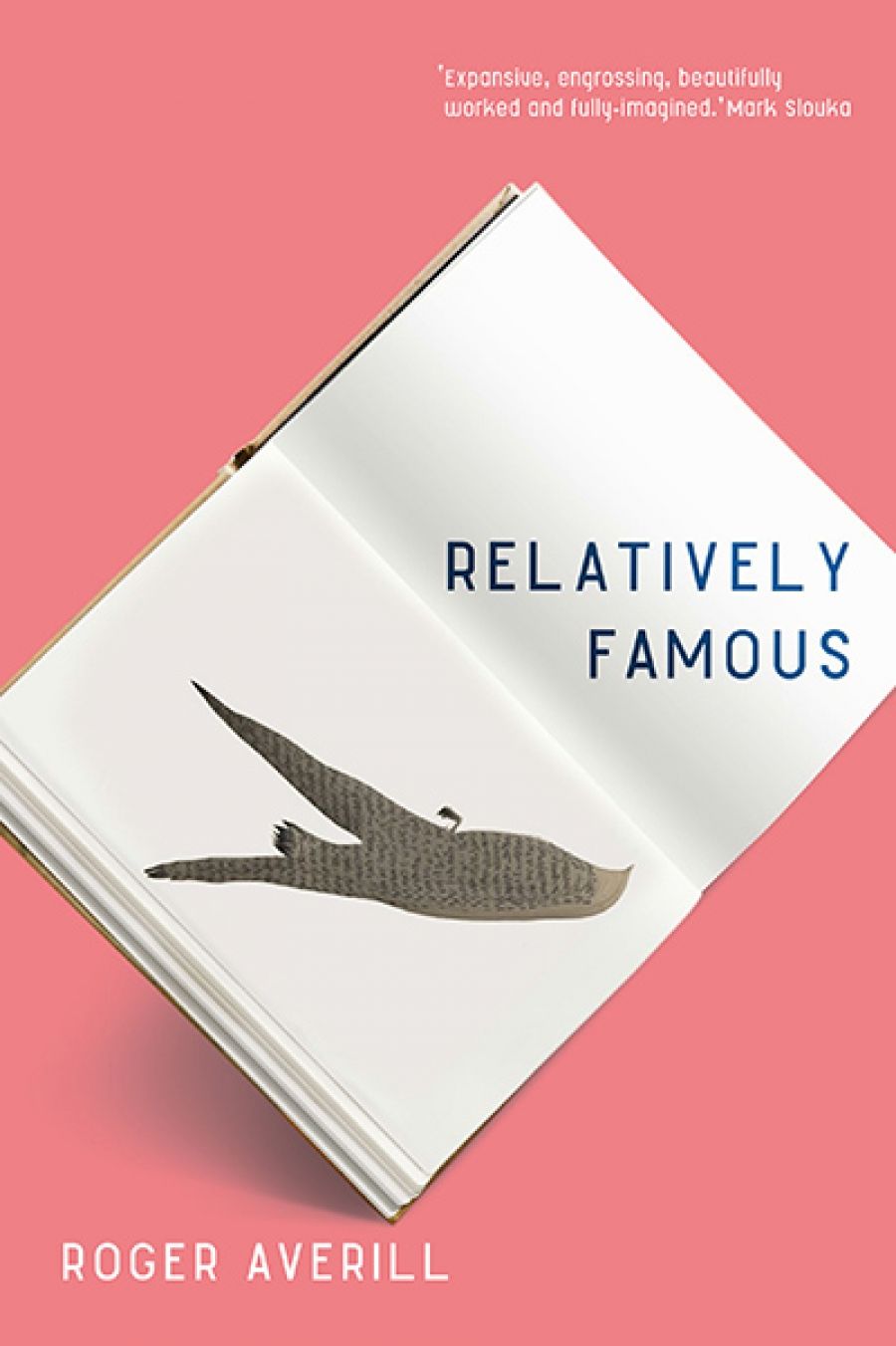
- Free Article: No
- Contents Category: Fiction
- Custom Article Title: Shannon Burns reviews 'Relatively Famous' by Roger Averill
- Review Article: Yes
- Online Only: No
- Custom Highlight Text:
In Relatively Famous, Roger Averill combines a fictional memoir with extracts from a faux-biography of the memoirist’s Booker Prize-winning father, Gilbert Madigan. The biography amounts to a fairly bloodless summary of the events of Madigan’s life, and his son’s memoir is similarly sedate. This makes for a limp but ...
- Book 1 Title: Relatively Famous
- Book 1 Biblio: Transit Lounge, $29.99 pb, 304pp, 9780995409897
Michael, by contrast, is stuck-on-the-spot. He envies his father’s talent, ‘And the clear line of purpose his sense of vocation accorded him, which meant that, unlike me, he never had to wonder what it was he should be doing with his life.’ Unlike Gilbert, Michael’s artistic pursuits (music and painting) hit a dead-end in early adulthood, soon after he married and had children. Michael is a decent and attentive father, but his transformation from artist to stay-at-home-dad and schoolteacher, alongside a pathological wariness of conflict and lack of personal ambition, render him sexually unappealing to his career-driven wife: ‘In bed, the expanse of sheet between us became a vast desert which my longing fearfully traversed. As often as not, my advancing hand would be brushed aside – from tiredness, for sleep. Repelled, my desire for connection shrivelled within me. Resentment blooming in its place.’
Because Michael is an extraordinarily passive protagonist, his wife speaks for Averill’s readers as much as herself when she says, ‘I need a reaction, Mick. I need something – action, reaction. Something. Something more than nothing’. Inertness is hard to admire and rarely seductive.
The central theme of Relatively Famous is articulated more than once. Michael writes: ‘Whether they are present or not, it seems we are destined to live out our lives in response to our parents’; and later, ‘I can now see that I have spent most of my adulthood trying to wrest back authorship of my life from the distant, omniscient narration of my father’s story.’ At other times, he is more expansive:
Surely, though, if the antecedents of all our failings can be laid at the feet of our parents, then they too should be thanked for having given us the capacity to live with the damage, to shape it in creative ways, to form relationships and raise kids, to hold down jobs. At what point can those of us who feel neglected be expected to jump our own shadows and face the reality that inherent to inheritance is the begetting of frailty and failure? For me, the answer is now, writing this. The arc it describes, my shadow leap.
Instead of being a supplementary figure in a great man’s life, Michael wants to take charge of his own story, come to grips with his father’s legacy, and take ownership of his own failures in the process. In essence, he wants to finally become a fully formed adult, and the story we read is his method of writing that adulthood into being.
 Roger AverillEarly in the novel, Michael recalls a time in his boyhood when his father attempted to rescue an injured bird and was bitten in the process: ‘Looking back, I am struck that the bird was forced to hurt my father in order to gain its freedom, and I wonder now if that is why I remember it.’ This suggests that Michael might have to do something similar if he is ever to emerge from his father’s shadow.
Roger AverillEarly in the novel, Michael recalls a time in his boyhood when his father attempted to rescue an injured bird and was bitten in the process: ‘Looking back, I am struck that the bird was forced to hurt my father in order to gain its freedom, and I wonder now if that is why I remember it.’ This suggests that Michael might have to do something similar if he is ever to emerge from his father’s shadow.
But Michael’s memoir is far from combative, frantic, or desperate; instead, he is commendably sympathetic to all of the people who ever wounded him and the inner forces that drive them, and he is equally tolerant of his own failings. For example, while recounting an uncharacteristic act of aggression on his own part, Michael acknowledges that ‘Resentment, defiance, rage, resignation’ were largely responsible, while ‘drunkenness’ and ‘thoughtlessness’ also played a role, before concluding: ‘It was an act, to be sure, but an act of casual madness’. Instead of amplification and intensification, he favours mollification and magnanimity.
Even a cruel twist of fate, which threatens to energise the story, is quickly deflated by Michael’s sympathetic reasonableness. Of course, he is right to be judicious where others might become enraged and impulsively destructive, but such overt level-headedness seldom translates into a compelling story. A flesh-and-blood Michael might be a pleasure to know, but as a character in fiction he is dreary. When Michael’s wife says, ‘You’re pathetic, Mick,’ the impatient reader may be inclined to agree.
Relatively Famous contains a handful of well-made and memorable vignettes, and Averill’s examination of fatherhood from the perspective of a man who fully embraces his domestic and parental responsibilities rings true, but that isn’t enough to rescue it from the lethargy of its narrators.


Comments powered by CComment